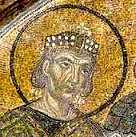 Justinian was one of the most famous and successful emperors of the Byzantine era after Constantine I. He was born in Ilyricum (near Skopje in Macedonia) in 482 or 483 AD. In 523 he married Theodora, a scandalous dancer thus he was criticized a lot, and ascended to the throne in 527 AD after the death of Justin I. After becoming an emperor, he fought against the Persians between 528-530 who invaded Mesopotamia and attacked on the Byzantine lands, and he stopped them thanks to one of his great commanders of the army, Belisarius.
Justinian was one of the most famous and successful emperors of the Byzantine era after Constantine I. He was born in Ilyricum (near Skopje in Macedonia) in 482 or 483 AD. In 523 he married Theodora, a scandalous dancer thus he was criticized a lot, and ascended to the throne in 527 AD after the death of Justin I. After becoming an emperor, he fought against the Persians between 528-530 who invaded Mesopotamia and attacked on the Byzantine lands, and he stopped them thanks to one of his great commanders of the army, Belisarius.
It was under his reign when Nika Riot destroyed the city and most of its important monuments including Hagia Sophia Church, killing over 30.000 people in five days of urban warfare. Justinian managed to end the riot with a great difficulty and then he dedicated himself on the reconstruction of Constantinople and its monuments; Hagia Sophia church, Hagia Irene church, Underground cistern were all built under his rule.
In 533 AD Justinian sent his army to Africa under the command of Belisarius to get rid of the Vandal Kingdom which caused the Byzantines many problems, and he succeeded. In 535 AD he sent his army to Italy with his most favorite commander to end the incapable government of Theodahad, landing in Sicily and advancing all the way to Rome and Ravenna fighting against the Goths until 540. Afterwards another war broke out with Persians in the east, who attacked on the Byzantines and captured Antioch. The war went on until finally Justinian signed a peace pact with Persians in 555 AD.
As for the interior affairs, Justinian supported the Roman Law even though Byzantine population were largely pro-Greek. He established the Justinian Code (Codex Justinianus) in 529 AD uniting all valid imperial laws under one and thus founding the base of almost all legal systems in Europe. He also introduced the silk-worm culture to Europe. But on the other hand, his passion for building great monuments such as Hagia Sophia put the Byzantine treasure under stress and this brought high taxes damaging the trade and industry. Same thing happened with a heavy war taxation to support his war campaigns.
Emperor Justinian died in 565 AD at the age of 83, after reigning for 38 years. He was succeeded by his nephew Justin II. Justinian was buried at the Church of the Holy Apostles in today's Fatih district in Istanbul, which was plundered by the Crusaders, later destroyed by earthquakes, and finally a mosque was built over it by sultan Mehmed II after the conquest of Constantinople.

